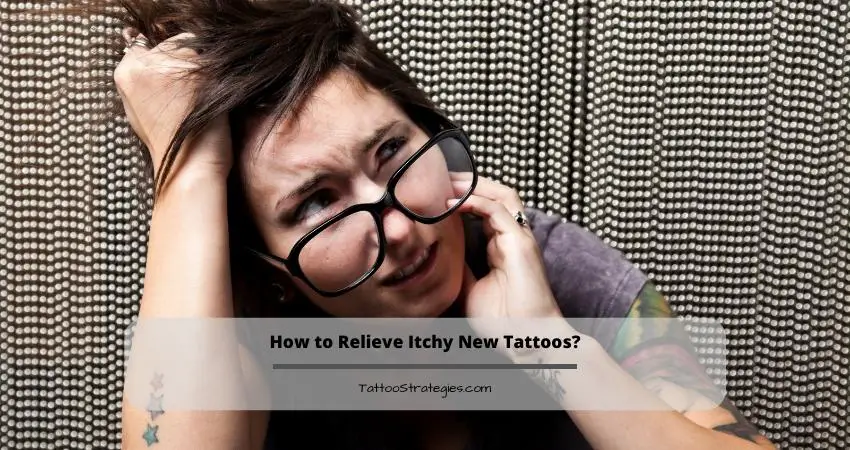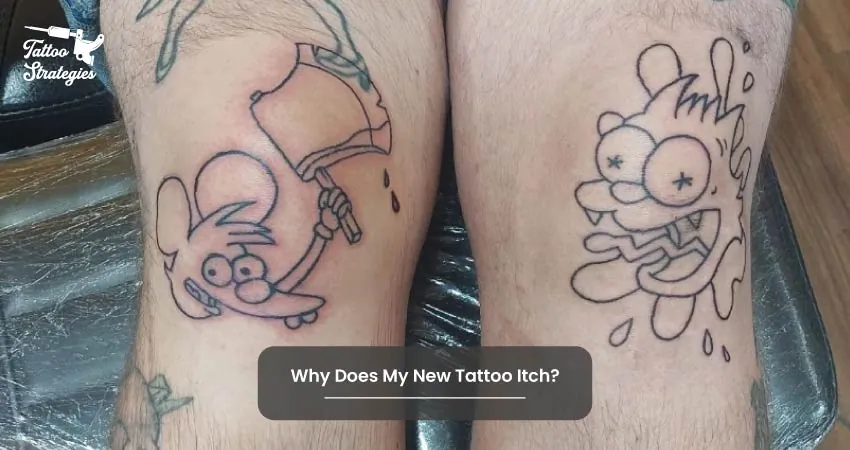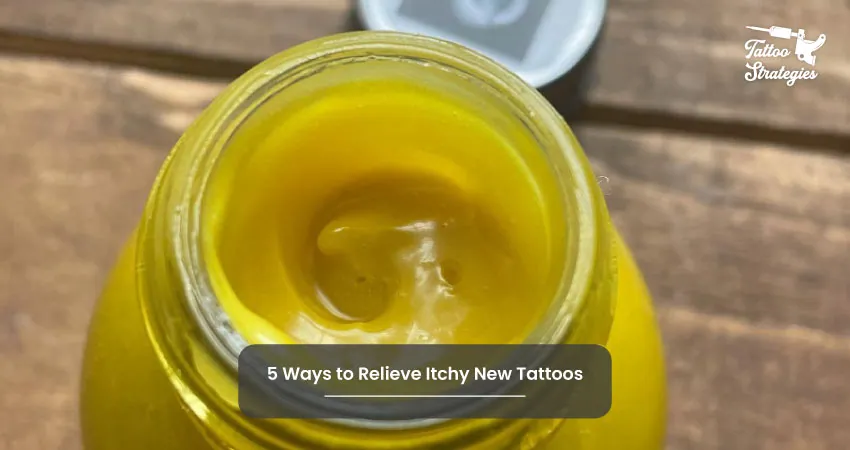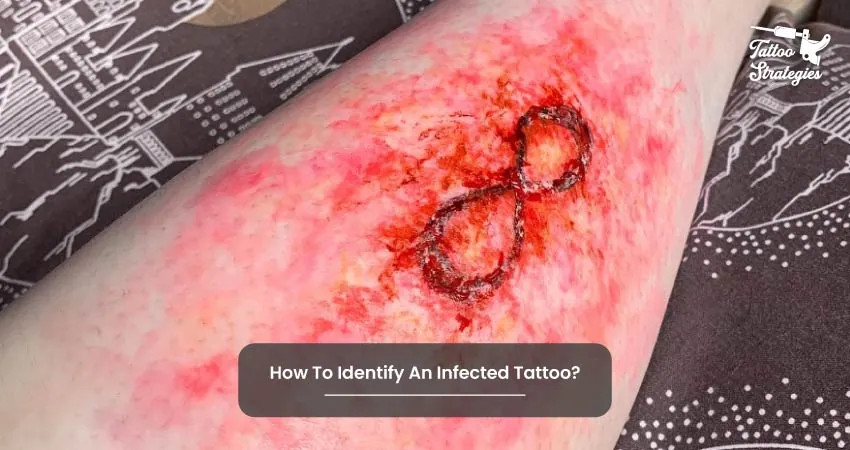How to Relieve Itchy New Tattoos? [5 Ways Explained]
Once you get through with the pain of getting a tattoo, a new hassle occurs, which is the constant urge to itch at a new tattoo. While getting a tattoo, needles, and ink hurt your skin, which can eventually make it itchy. So, the question is, how to relieve itchy new tattoos?
Understanding what’s triggering your itchy tattoo is the first step in finding a solution. Care must be taken to avoid damaging the ink or the skin around a new tattoo since this is particularly vulnerable to infection and harm. Various methods, such as OTC creams, cold compression, and moisturizers, relieve the itching from new tattoos.
Follow this article as it also covers how to identify infected tattoos and get relief from an unwanted situation.

Why Does My New Tattoo Itch?

When you get a new tattoo, your skin will act like it has just been hurt and is now healing. As the body tries to get rid of the infection and heal itself, the skin gets red and irritated (a part of our immune process).
And itching is one of the common signs when the tissues of your skin start repairing themselves.
- One of the most common reasons why itches are due to tickly peeling skin. As the skin peels, it will pull away from the skin, which is already very sensitive. The loose pieces will rub and tickle the skin around them as they move.
- The next common issue is the regrowth of shaven hair. Shaving the areas where you get the tattoo is prep work for the whole tattooing session. It’s done to ensure that the tattoo needles don’t get stuck in any hair growing in the area. As the hair grows back and pokes through the skin, it can hurt and itch.
- You may not want a tattoo if you have eczema or psoriasis. Flare-ups are possible after getting a tattoo. The common consequences of this are red, itchy patches anywhere on your body, including tattoos.
Some other questions that might come into your mind are answered below:
Why Does My Old Tattoo Itch?
Plastic-based dyes can be used to make pigments for tattoos. The American Academy of Dermatology (AAD) says that an allergic reaction to a tattoo can happen immediately or even years later. For this, you might experience itching, redness, and bumps that look like bee hives.
Should You Itch Your New Tattoo?
No, you never should itch a fresh tattoo. Scratching can pull off any scabs or skin that has started to heal over the damaged area.
Not only that, but the dirt under your fingernails can get into the open wound and make it much more likely that your tattoo will get infected. Scratching your tattoo to relieve itching may result in removing a scab, which can result in losing some of the tattoo’s unresolved ink and the need for a touch-up.
5 Ways to Relieve Itchy New Tattoos

An itchy tattoo, like any other skin irritation, may be alleviated using less harmful means than scratching. Itching may not go away entirely; it’s the price of a tattoo. These strategies should make healing easier.
1. OTC Creams and Ointments
OTC lotions and ointments should generally not be used on fresh tattoos since they might slow down the skin’s natural healing process. But if your older tattoo is irritating, you might try using topical hydrocortisone cream.
2. Cool Compresses
The itching and swelling might both benefit from a cool compress. Inquire with your physician before applying any kind of compress on a fresh tattoo. According to The Nemours Foundation, new tattoos usually need two weeks to heal fully.
3. Keep The Area Moisturized
The remedy to dry, itchy skin may lie in using a moisturizer. Choose a heavier moisturizer like cocoa butter or oatmeal lotion for older tattoos. Avoid using colored or scented items, as these may aggravate your condition worse and make you scratch more. When you get a new tattoo, consult your artist on how to best care for it and keep it hydrated.
The belief that certain moisturizers or chemicals might remove fresh ink has led some tattoo artists to warn against their use. Most people agree that the greatest kind of hand lotion is one without any added aroma.
4. Oatmeal Bath ( For Old Tattoos)
Itchy skin, particularly older tattoos, may be soothed with a colloidal oatmeal bath. New tattoos should not be submerged in water for at least two weeks. Thus, this procedure should never be used on them.
5. Medications for Skin Conditions
Tattoo itching due to a prior skin condition may be treated with topical treatments prescribed by your doctor.
Conditions including eczema, rosacea and psoriasis fall within this category. Immunosuppressants are required for those with a sarcoidosis diagnosis to alleviate symptoms and prevent immune system damage.
When To See A Doctor?
It’s crucial to see a doctor if you think you could have an infection. If you’re feeling sick with a fever and chills, get checked out right away.
Antibiotics may help cure infections and stop them from spreading, so your doctor may recommend taking them. Getting an infection after getting a tattoo is risky since it may cause major problems and scars.
If you have any of the following, you should see a doctor:
- Fever
- Continuation of heat and cold.
- Too much shivering.
- Tattoed areas are getting swelled.
- Getting pus on the skin.
- spots of red around the area.
How To Identify An Infected Tattoo?

A rash or red, bumpy skin around the tattoo is the most common sign of a tattoo infection.
Sometimes, especially if you have sensitive skin, the needle may just irritate your skin. If so, your symptoms should go away after a few days. But if the signs last more than a week, you should see your tattoo artist or a doctor.
Conclusion
So, by now, you should have a clear idea about how to relieve itchy new tattoos.
Experiment with different methods such as ointment, moisturizer, cold compress, etc. and if you have to, use multiple methods at the same time to see which one fits you. Do not itch your new tattoo ever, as it may worsen the situation.
If you think the itchiness is getting worse, go and check out a doctor’s advice, as it may indicate a potential infection.
